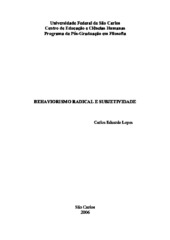Behaviorismo radical e subjetividade.
Resumo
In radical behaviorism, subjectivity is studied, generally speaking, in terms of the theory of private events. The theory of private events has its roots in the problem of accessibility in the thesis, that is, that a person has privileged access to certain events that occur under his skin (privacy). If we examine the origins of this thesis, we will find
that it reaches radical behaviorism via the paths of dualism and logical positivism (through methodological behaviorism). However, if we interpret radical behaviorism on the basis of a relational metaphysics, the influence of dualism and logical positivism can be overlooked. This opens the possibility that radical behaviorism can do without the theory of private events. Nevertheless, if we abandon the theory of private events, what will be the consequence for of the study of subjectivity? The main objective of this work is to answer this question. Here, we uphold the thesis that the study of subjectivity in radical behaviorism, without reference to the theory of private events, can be fruitfully pursued. This can be achieved through the concepts of body and world , and
through the construction of a theory of the self compatible with radical behaviorism. Thus, this work seeks to offer an interpretation of radical behaviorism, based on a relational metaphysics, which separates subjectivity from privacy. This interpretation also considers the possibility of productive dialogues between radical behaviorism and other psychological and philosophical theories (such as James psychology,
Gestalttheorie , and analytic philosophy). According to this interpretation, subjectivity is related to the products of discriminative verbal behavior (identified as the I). As this
product depends on a verbal community (which arranges discriminative contingencies), subjectivity comes to be considered social. Moreover, the person-verbal community
interface renders the defense of a pure subjectivity not viable, as well as that of an unmitigated objectivism. Because of this, radical behaviorism may be capable of deconstructing the objective-subjective debate: these terms are subordinated to the relation of behavior. It is concluded that the radical character of radical behaviorism is not due to its dealing with private events, but to the study of behavior without resorting to non-behavioral instances.
